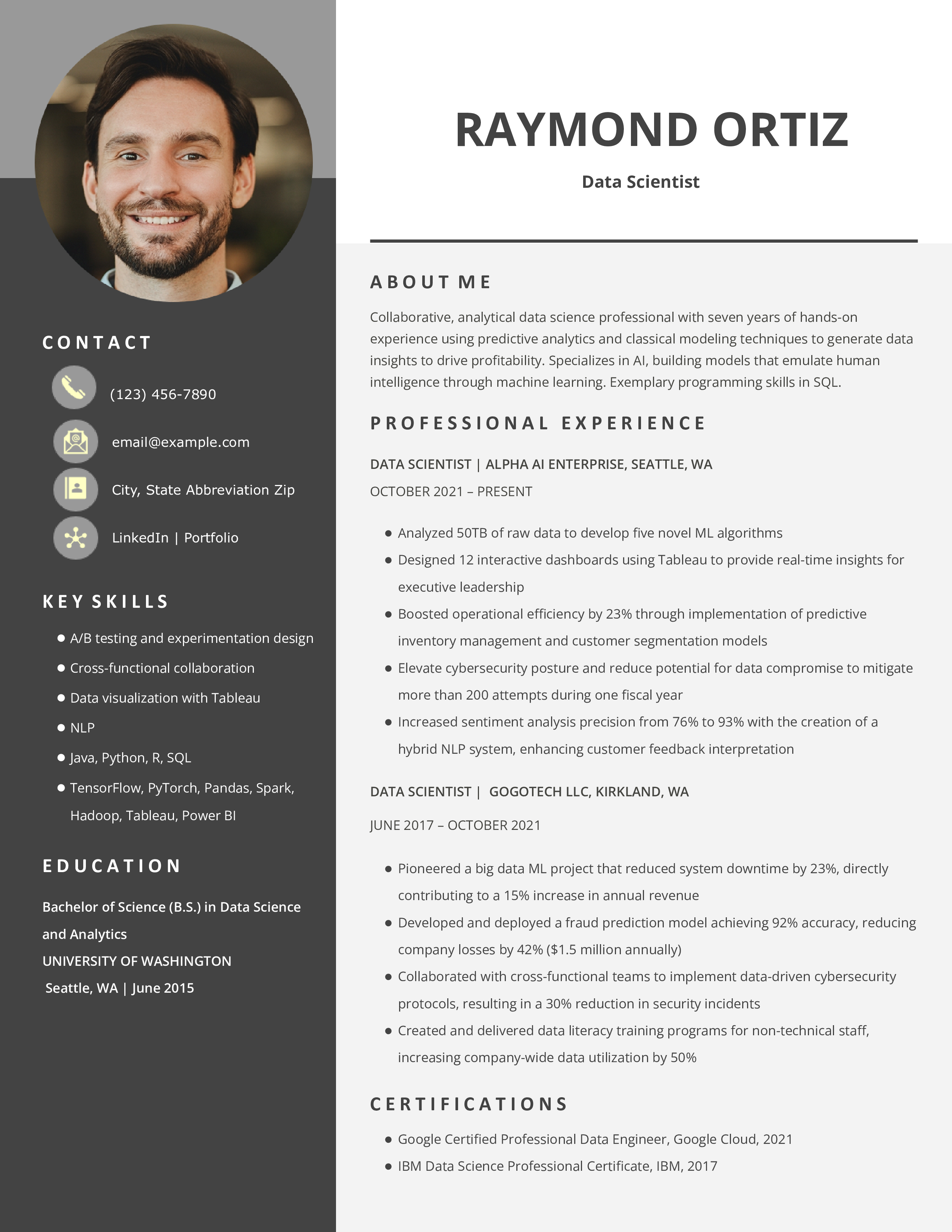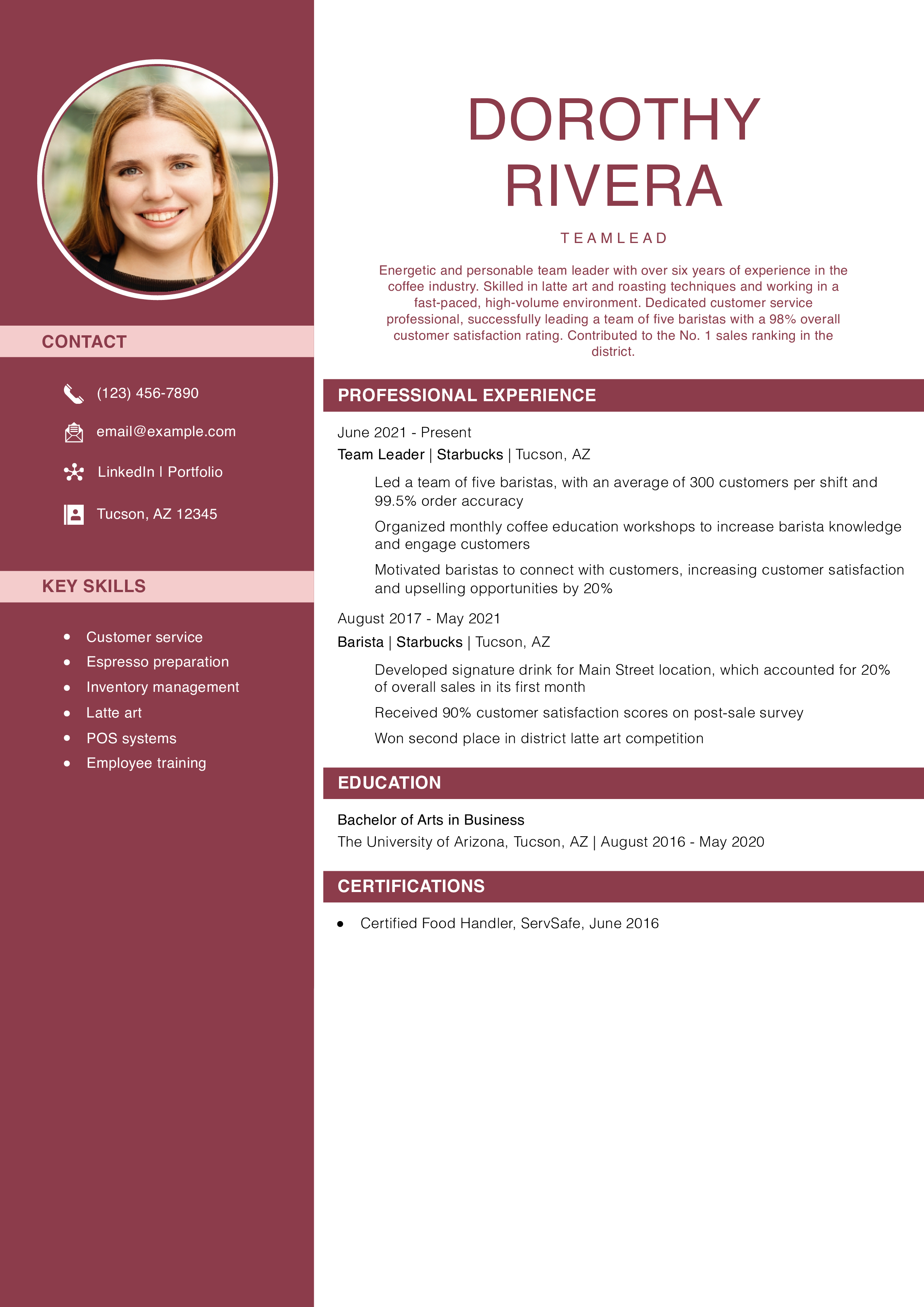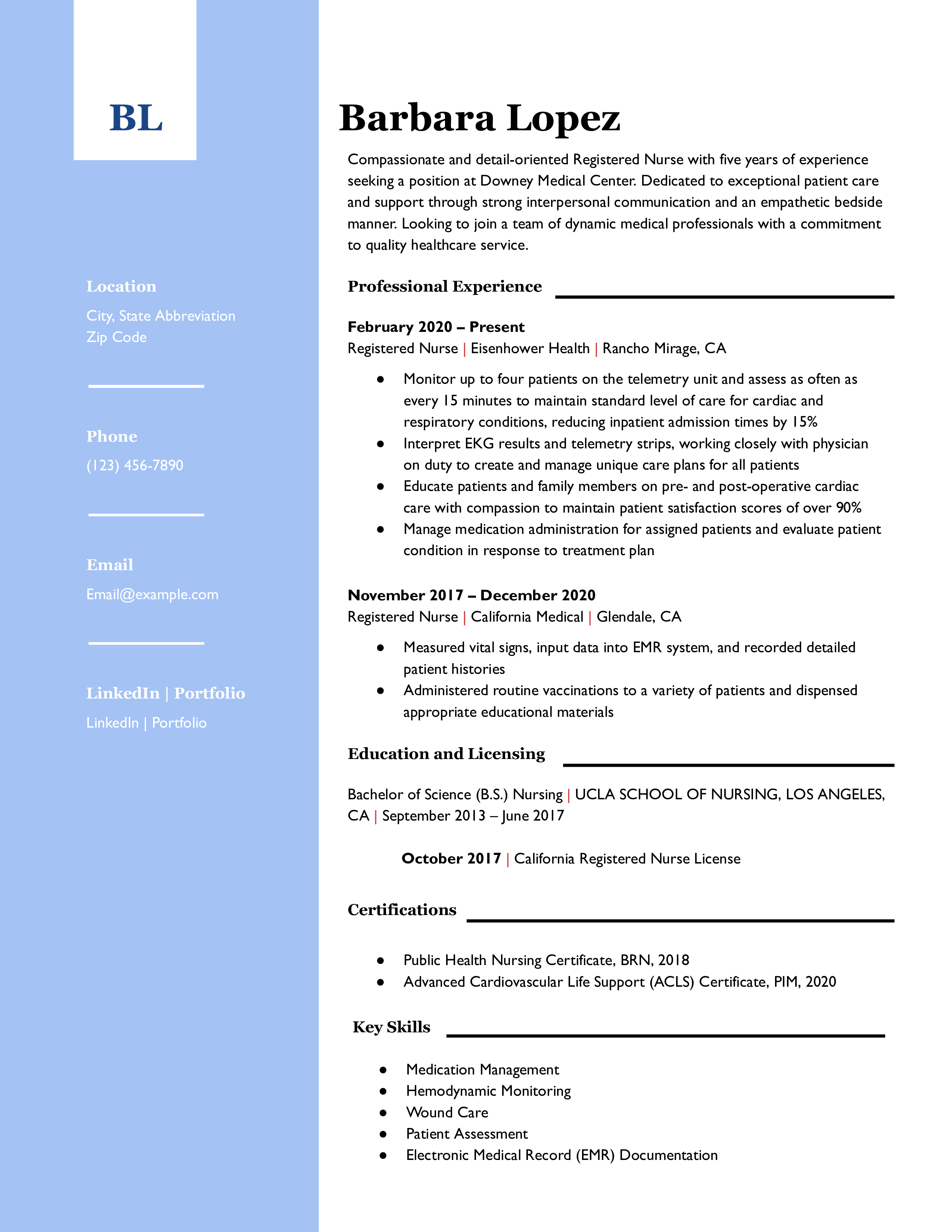To advance your career as a biologist, you need an exceptional resume that highlights your comprehensive scientific knowledge and unique talents as a researcher. Paint a compelling picture of the various research studies you’ve led throughout your career. Emphasize how your contributions have positively impacted laboratory operations and data integrity. Throughout this guide, we’ll provide expert tips and insights to help you craft a biology resume that stands out to potential employers.
Key takeaways:
- Emphasize your scientific expertise: To quickly grab the hiring manager’s attention, showcase your areas of expertise as a biologist, such as molecular biology, environmental science, or drug discovery.
- Quantify your professional achievements: Incorporate hard numbers and data to convey the impact of your contributions. For example, you might emphasize how your efforts helped to improve data integrity for a multi-million dollar research study.
- Integrate keywords from the job description: Feature key terms from the job posting to ensure alignment with applicant tracking systems (ATS), such as statistical modeling, polymerase chain reaction (PCR) analysis, and cell-based assays.
Most Popular Biology Resumes
Biology resume with no experience
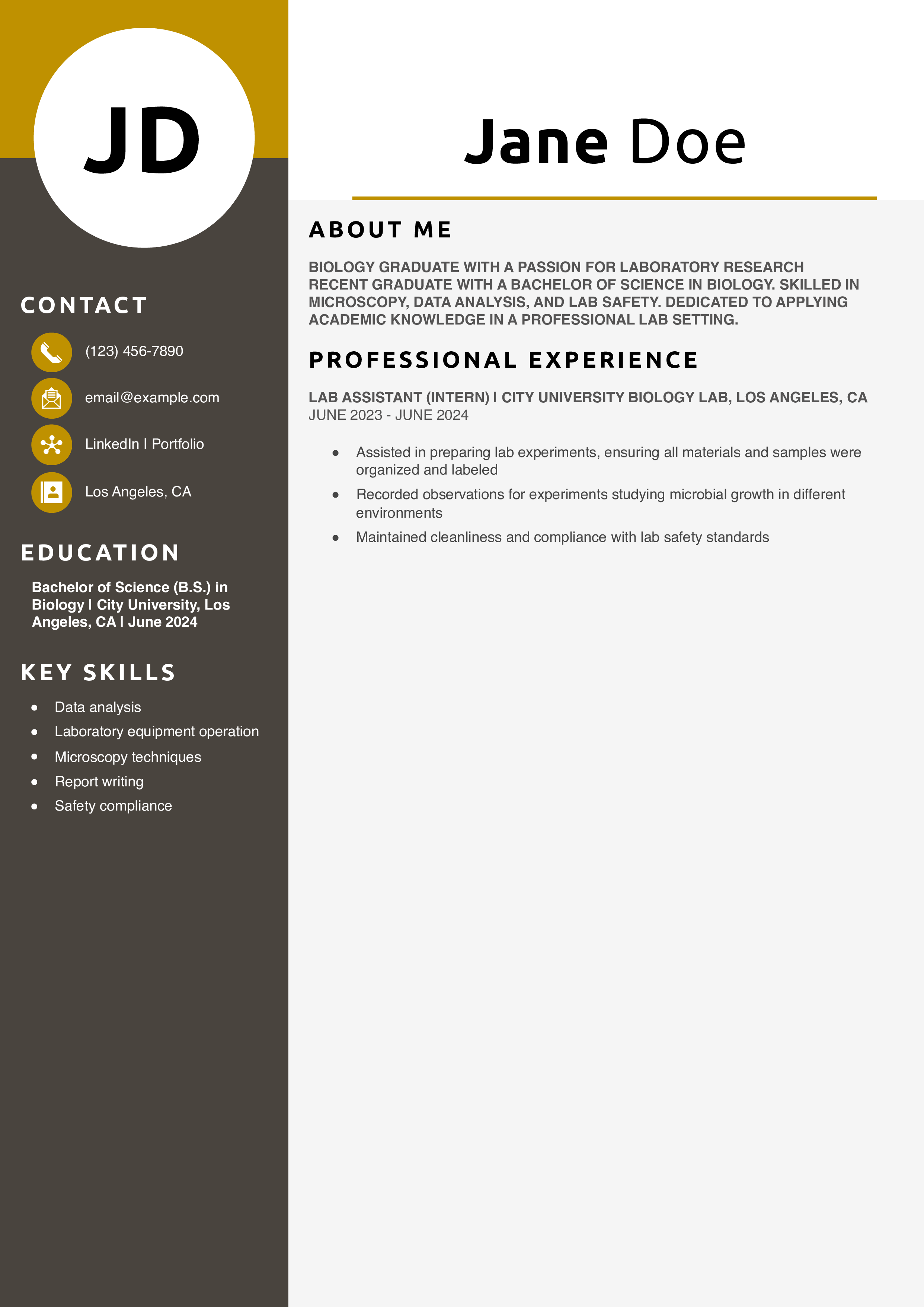
Why this biology resume example is strong:
This resume highlights transferable skills, academic achievements, and internships to demonstrate readiness for entry-level roles. The clean format and clear focus make it a strong choice for candidates starting their biology careers. Learn how to write a resume with no experience here.
Biology Student Resume Example
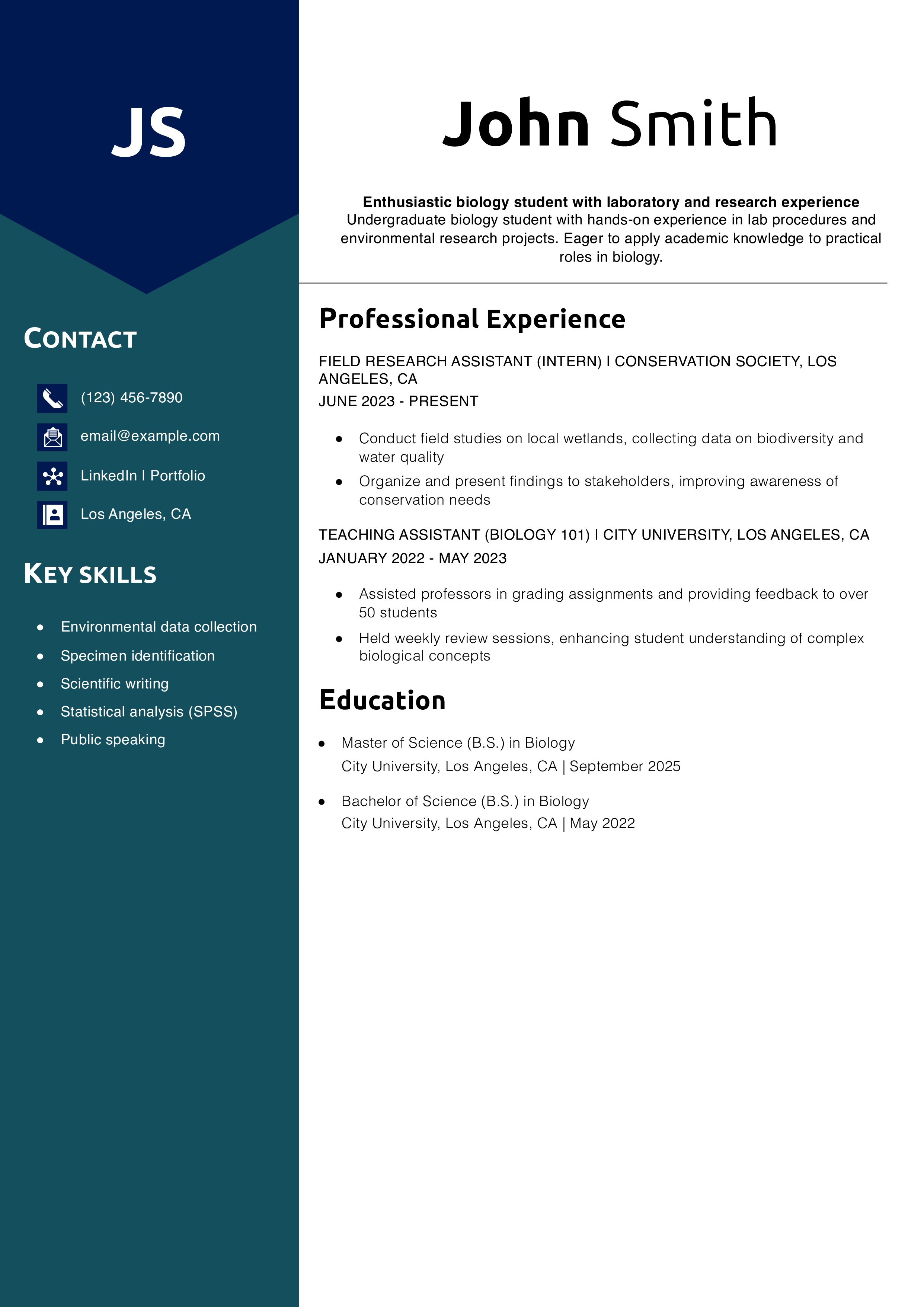
Why this biology student resume example is strong:
This resume effectively highlights relevant coursework, part-time lab roles, and extracurricular involvement, showcasing the candidate’s proactive approach to gaining hands-on experience.
See how to feature your education on your resume here.
Biology Internship Resume Example
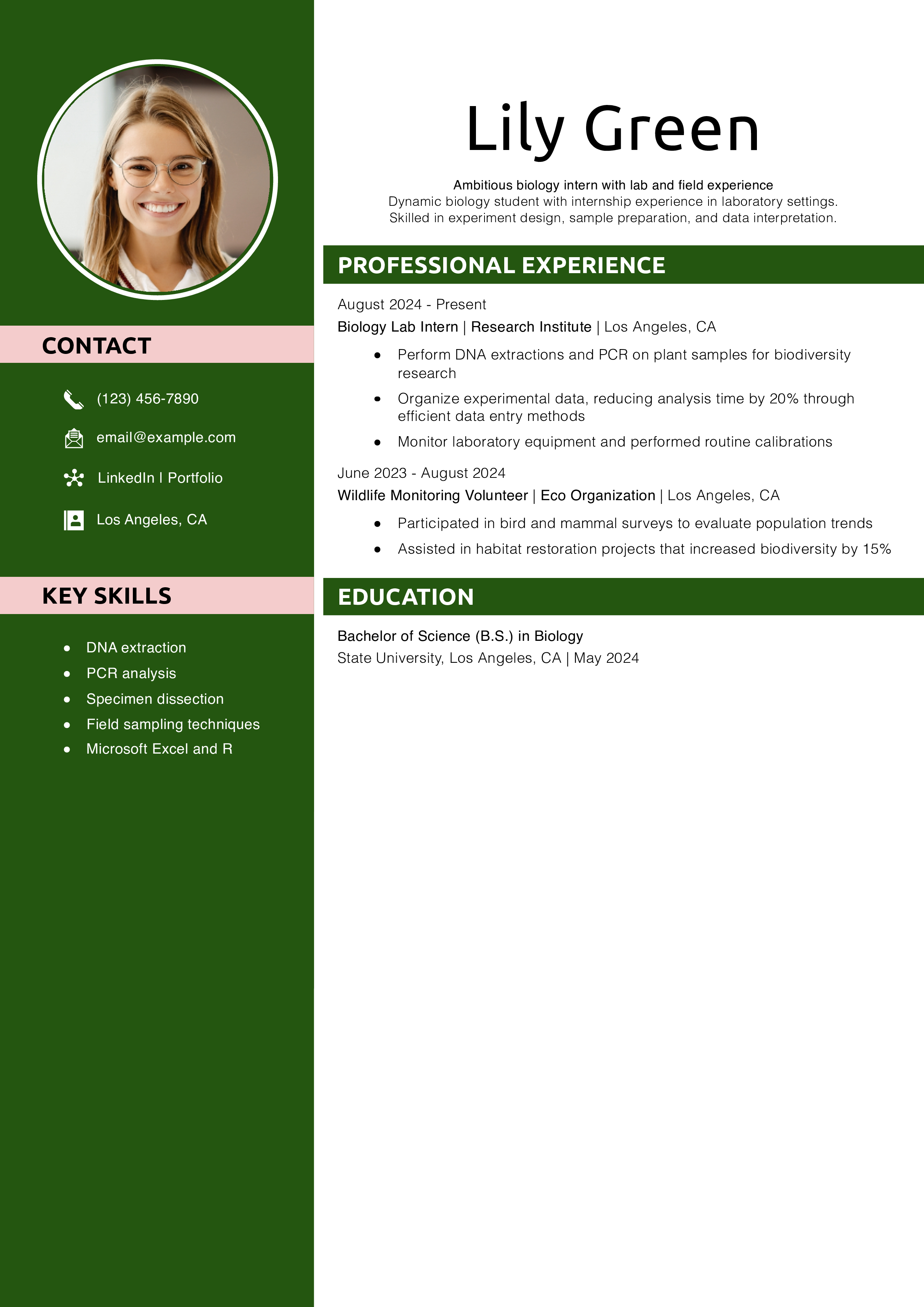
Why this biology internship resume example is strong:
This resume demonstrates practical skills gained during internships, focusing on quantifiable outcomes like improving lab efficiency by 20%. Explore tips for writing a resume summary here.
Biology Research Assistant Resume Example
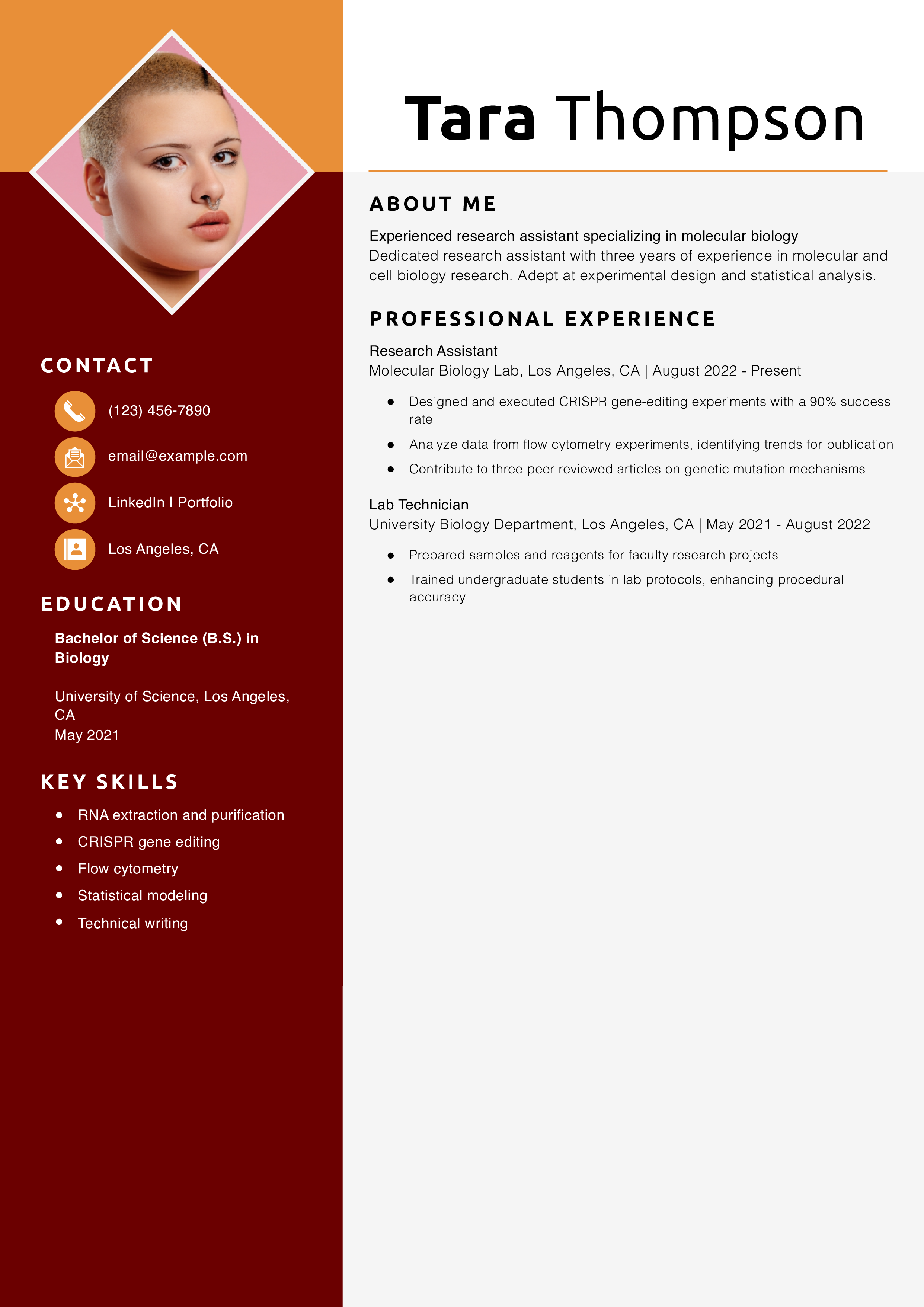
Why this biology research assistant resume example is strong:
This resume focuses on technical lab skills and research contributions, such as co-authoring papers and conducting experiments that led to measurable improvements.
Learn about using action verbs to make your resume stand out.
Marine Biology Resume Example
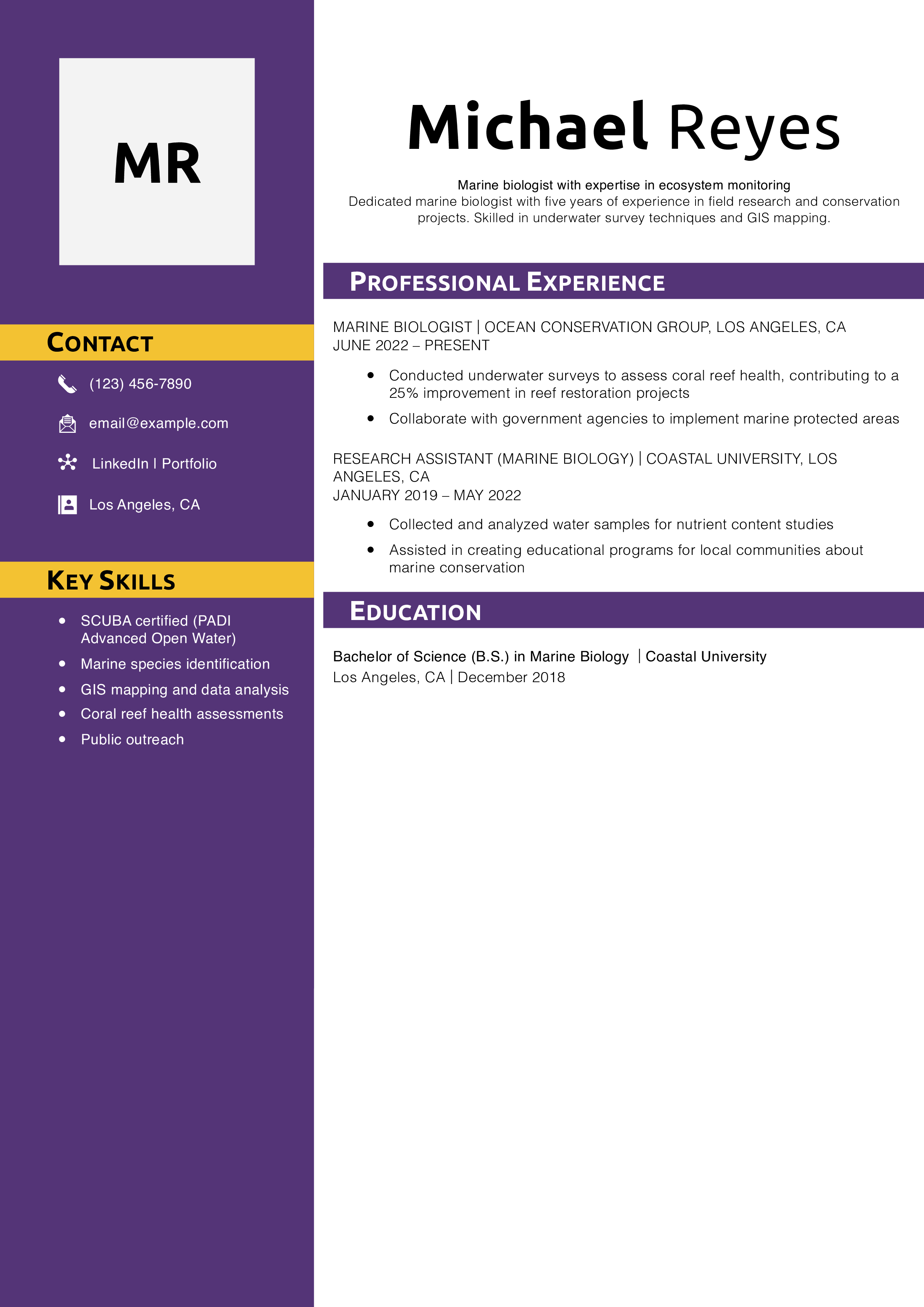
Why this marine biology resume example is strong:
This example effectively emphasizes unique skills like scuba diving and underwater data collection. Including specific project outcomes enhances its appeal.
Discover how to highlight your specialized skills in our guide.
Molecular Biology Resume Example
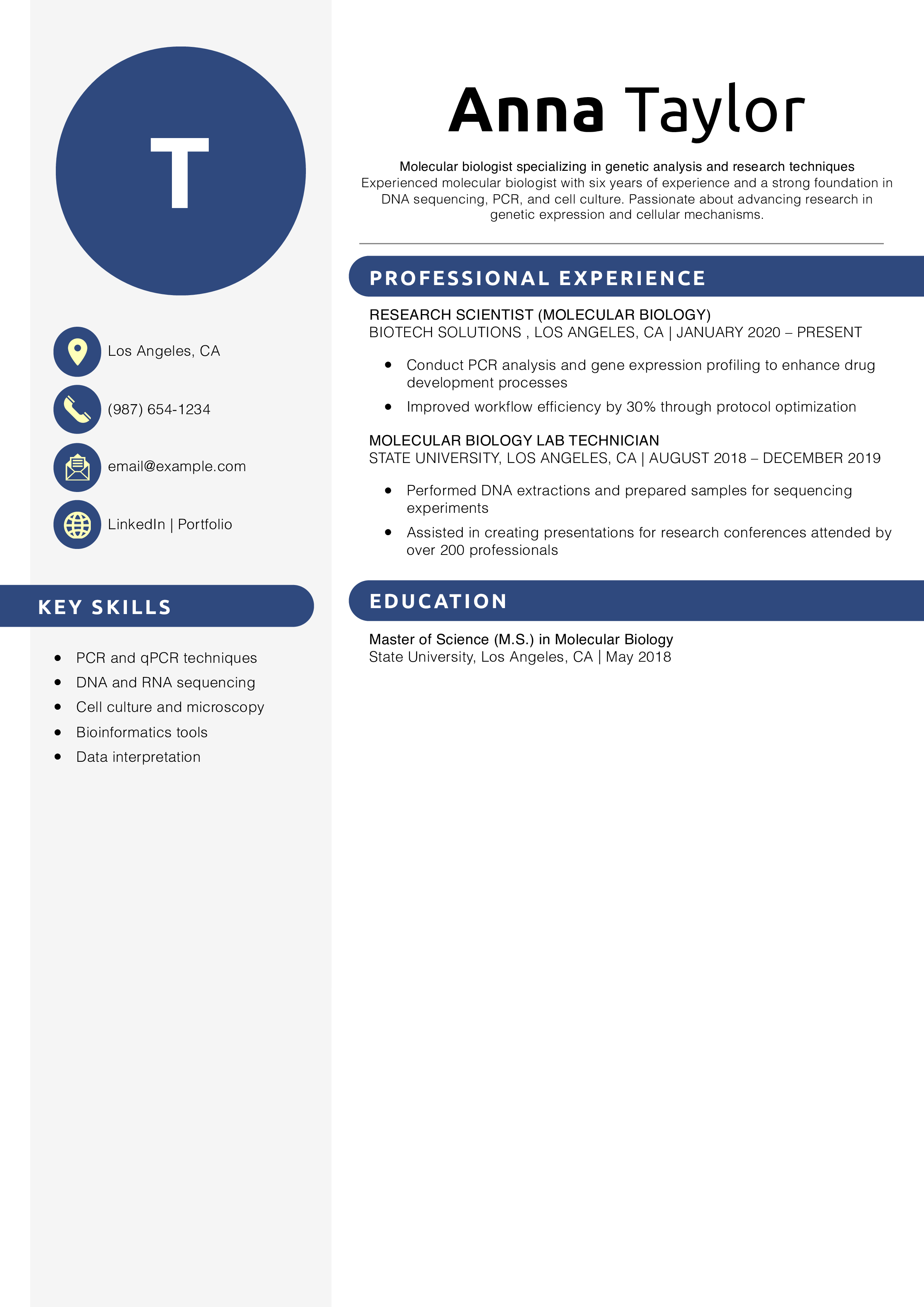
Why this molecular biology resume example is strong:
This resume effectively highlights specialized skills in genetic research and PCR techniques while demonstrating measurable contributions, such as increasing efficiency by 30%.
Learn more about how to enhance your resume in our comprehensive guide.
Conservation Biologist Resume Example
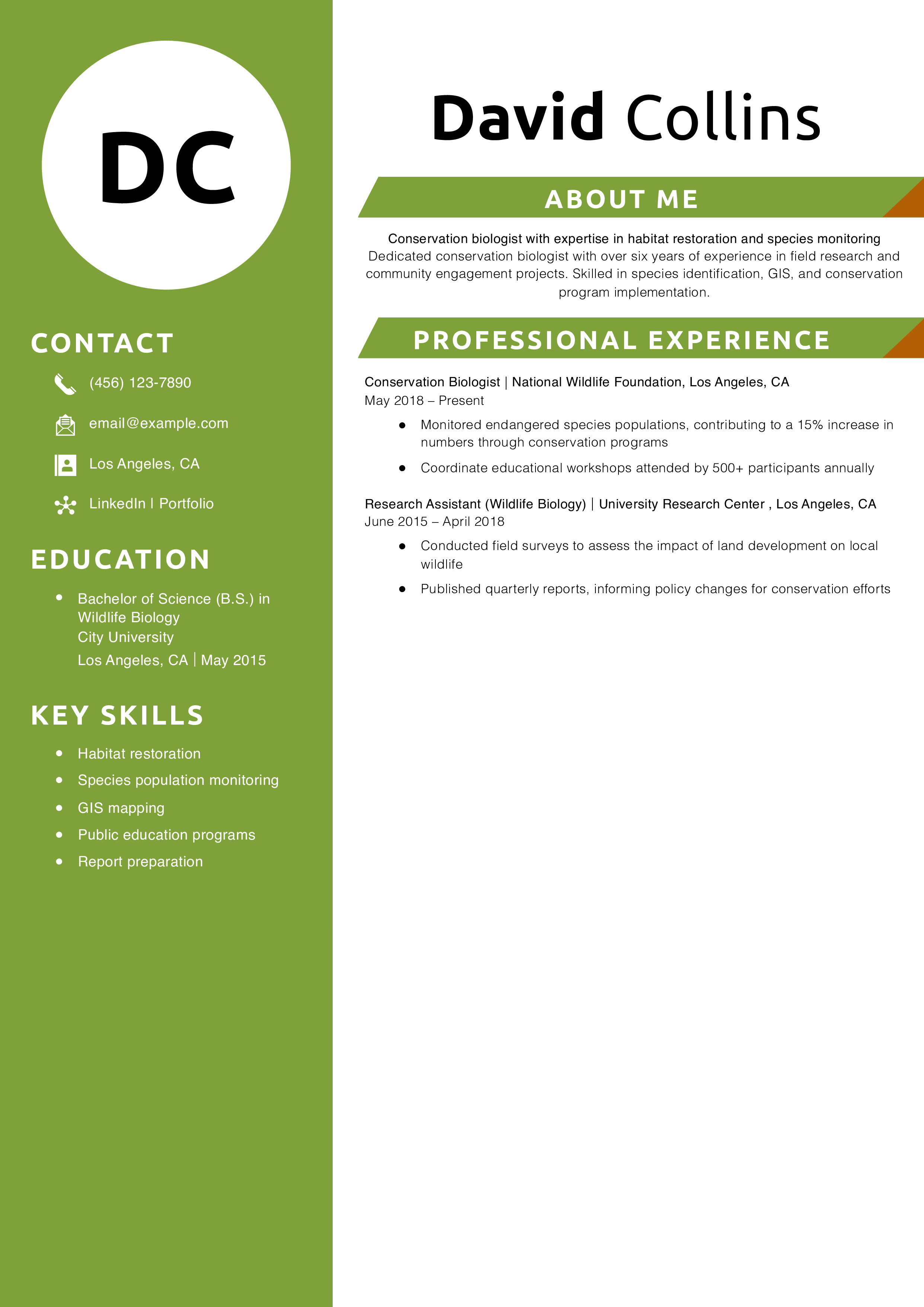
Why this conservation biologist resume example is strong:
This example effectively communicates fieldwork experience, conservation achievements, and public engagement, aligning well with nonprofit and governmental roles.
Learn how to write a compelling resume summary here.
Environmental Biologist Resume Example
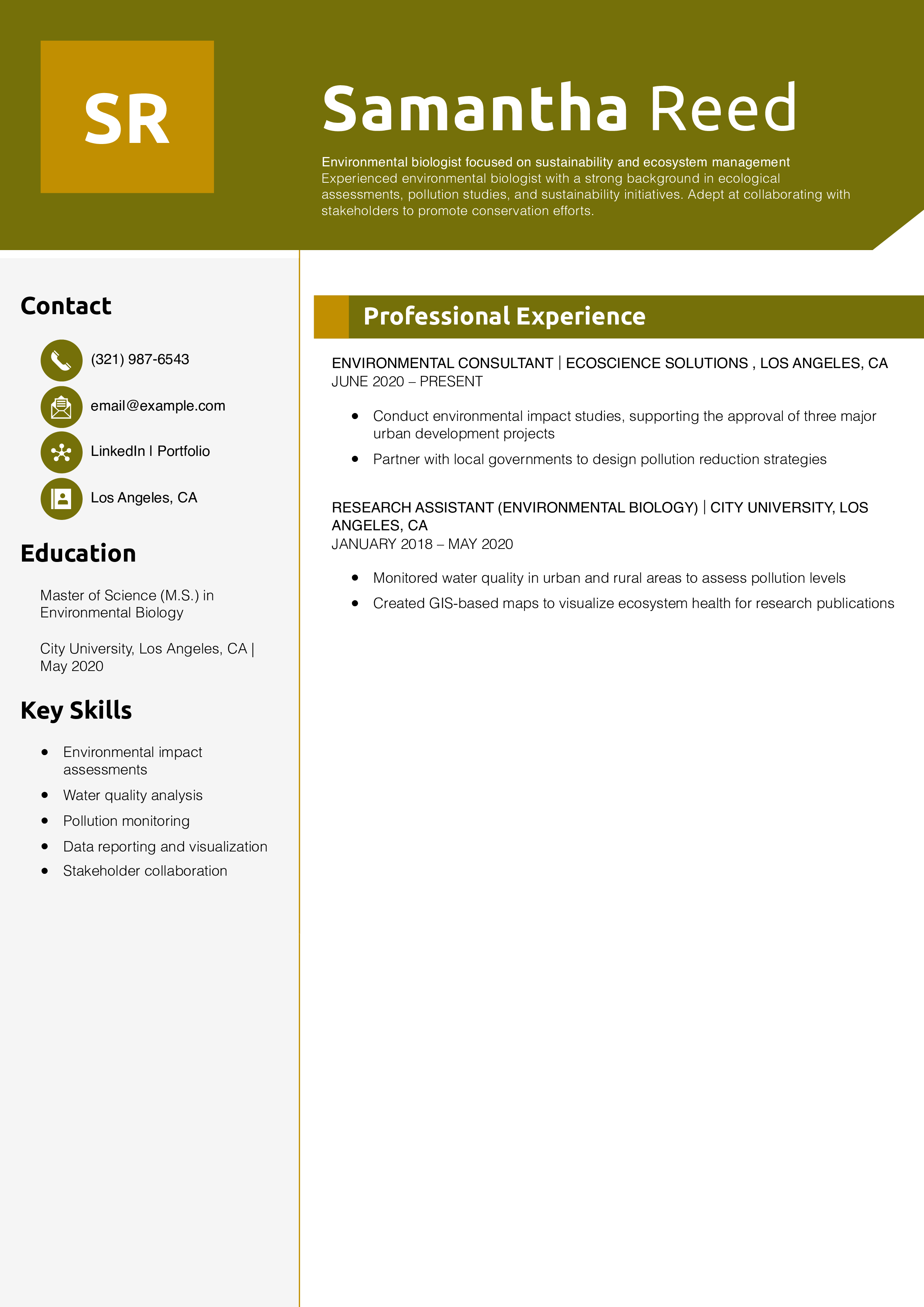
Why this environmental biologist resume example is strong:
This resume emphasizes environmental impact assessments and community collaboration, making it ideal for sustainability and environmental consulting roles. Learn how to list achievements using bullet points here.
Microbiology Resume Example
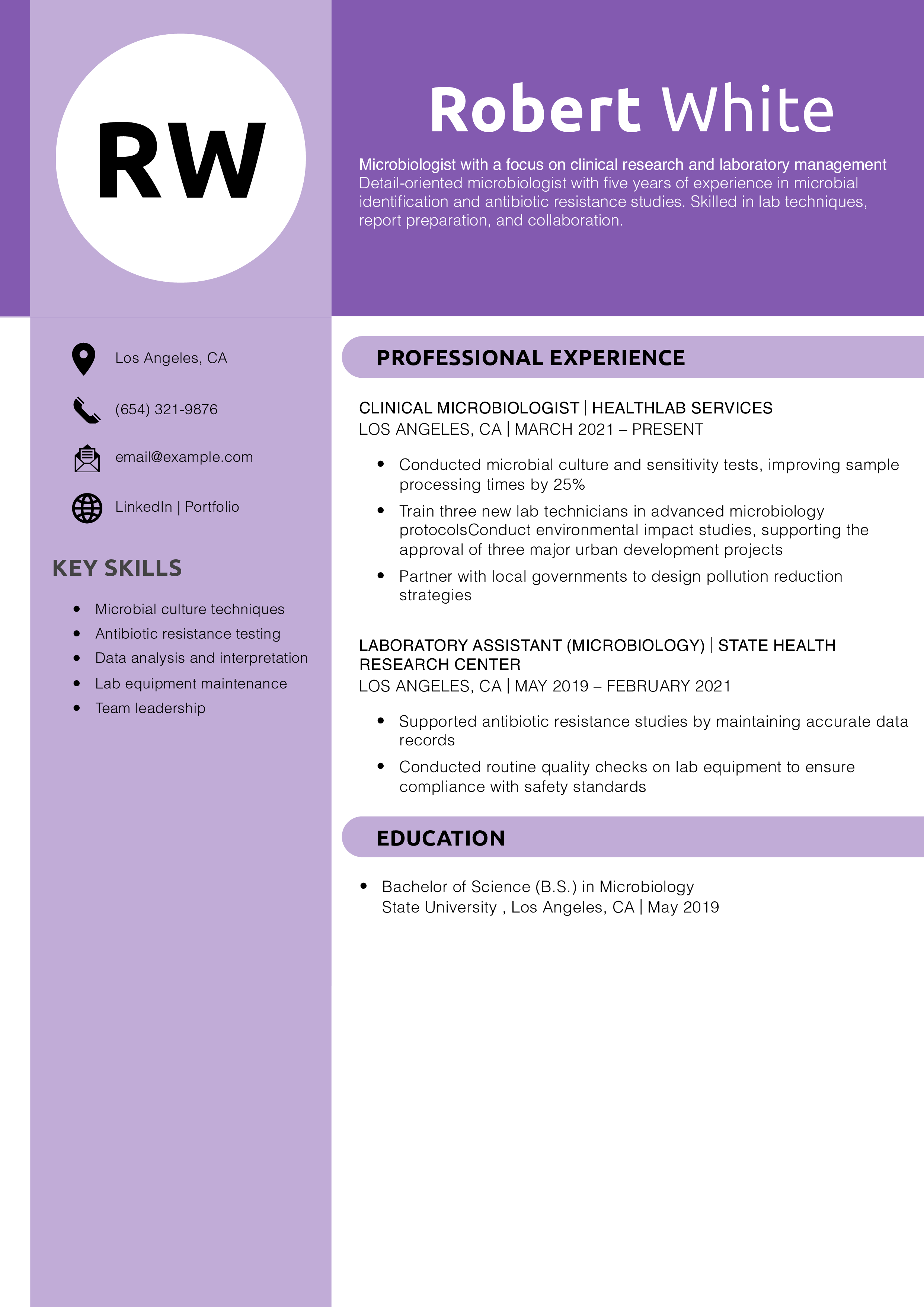
Why this microbiology resume example is strong:
This example demonstrates microbial analysis and laboratory management expertise, supported by quantifiable outcomes like improved sample processing times.
Explore how to craft a standout skills section in our guide.
Biotechnology Resume Example
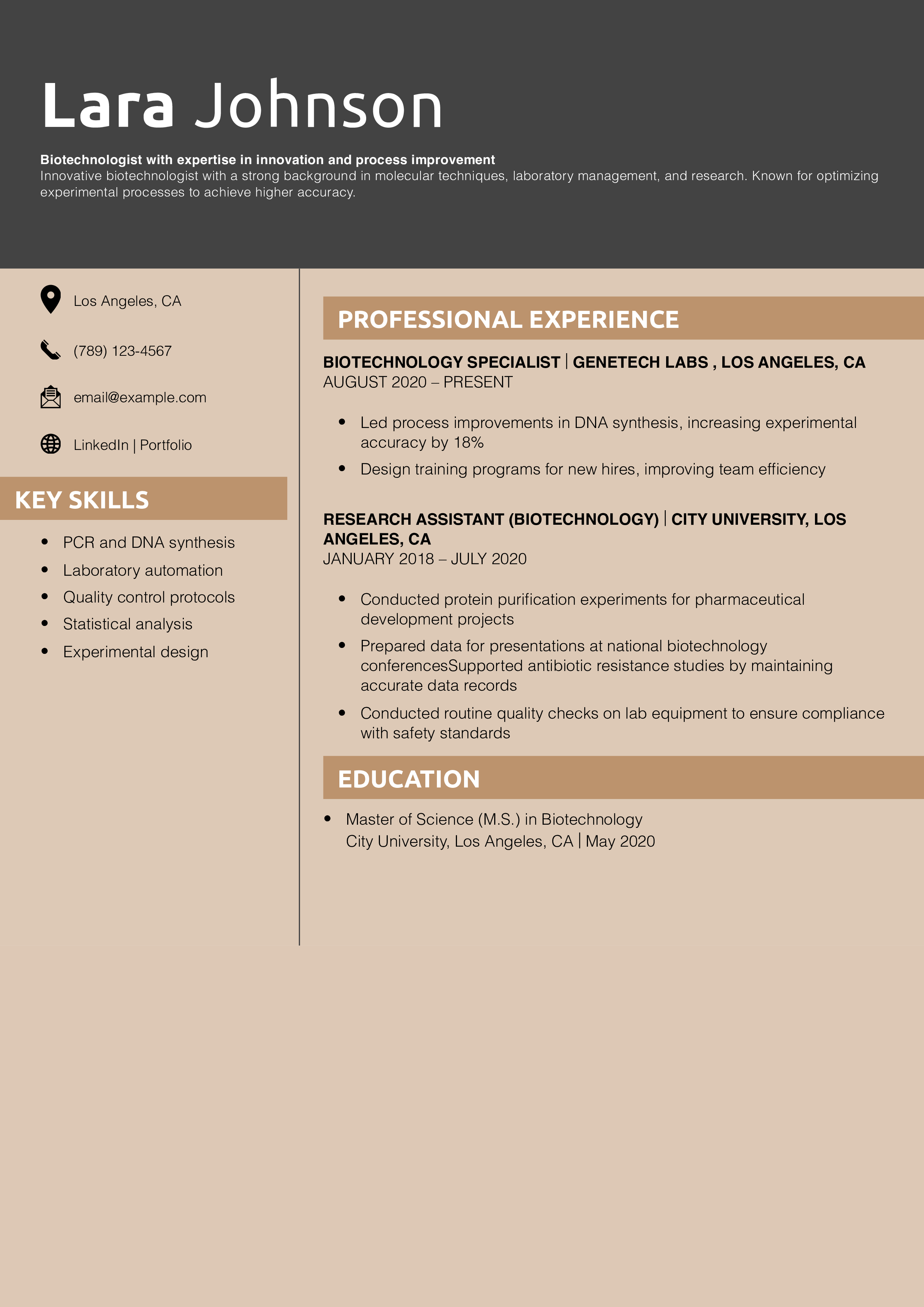
Why this biotechnology resume example is strong:
This resume showcases technical expertise in biotechnology, including innovation in lab techniques and project outcomes, like improving experimental accuracy.
Learn about emphasizing technical skills on resumes.
Cell Biologist Resume Example
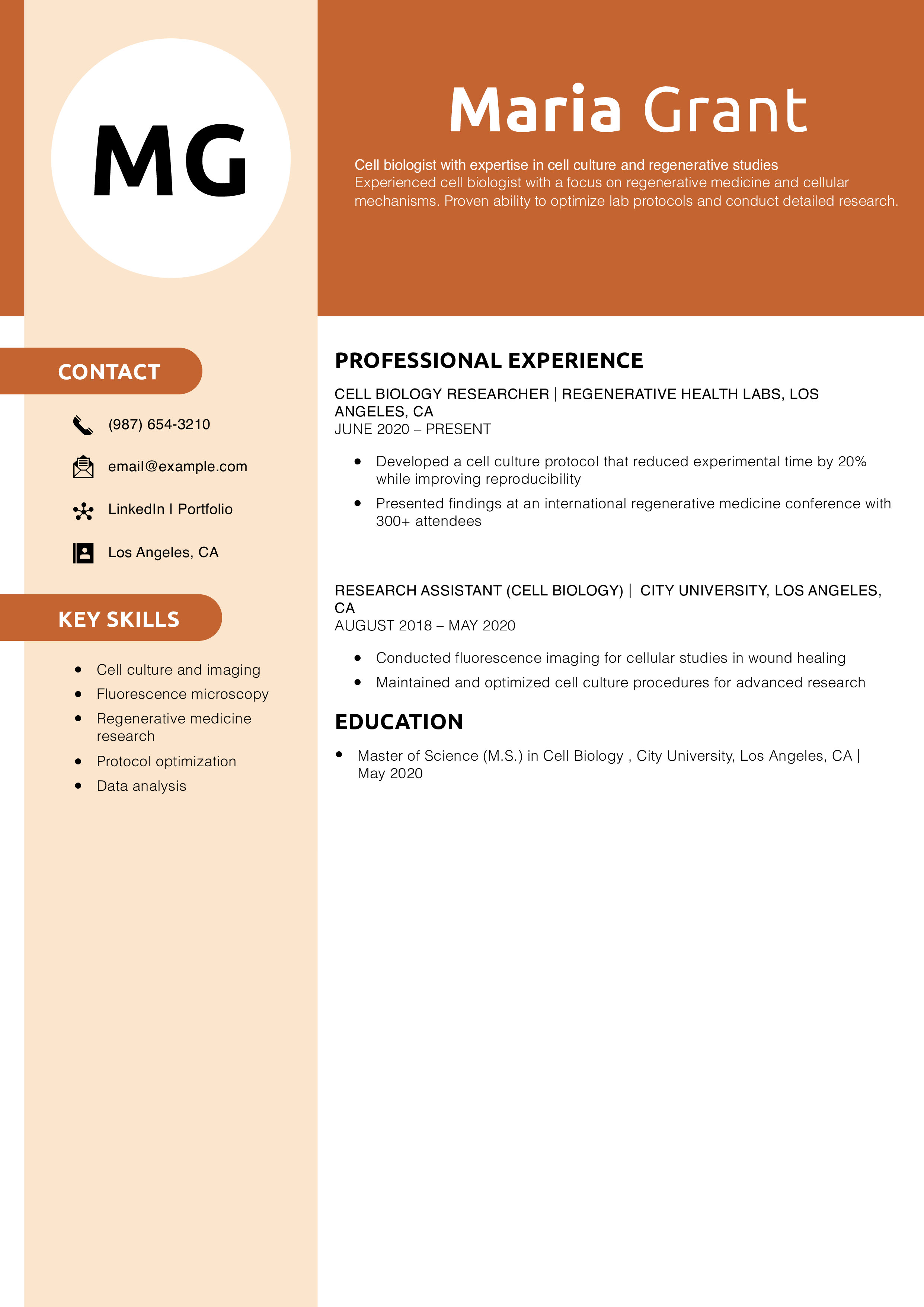
Why this cell biologist resume example is strong:
This example demonstrates expertise in cellular studies and highlights impactful achievements like developing a protocol that reduced experiment time by 20%.
Learn how to create a compelling profile using our guide.
Biomedical Researcher Resume Example
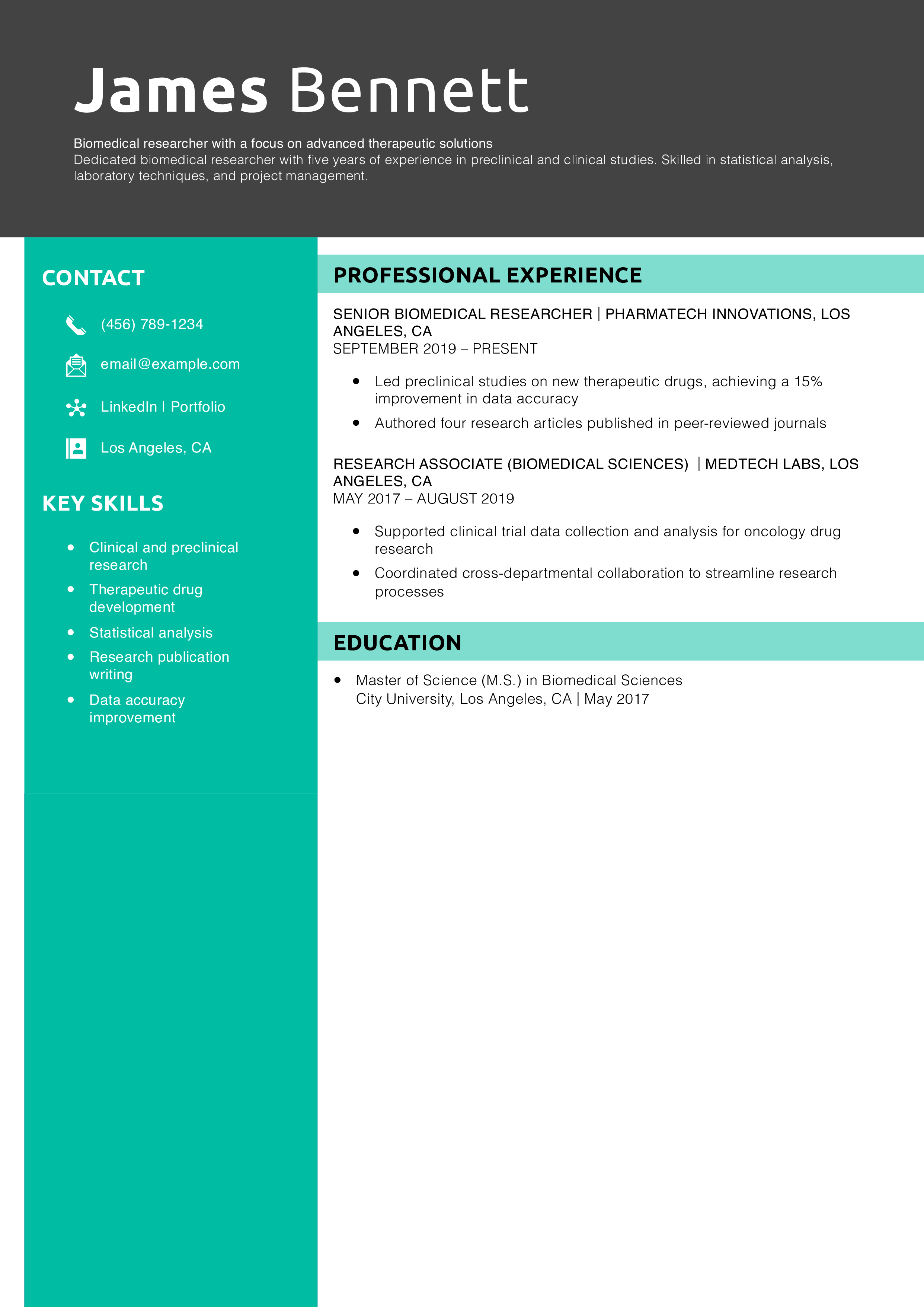
Why this biomedical researcher resume example is strong:
This example emphasizes contributions to groundbreaking studies and showcases quantitative outcomes, such as a 15% improvement in data accuracy. Learn more about how to capture your work history in our guide.
Biostatistician Resume Example
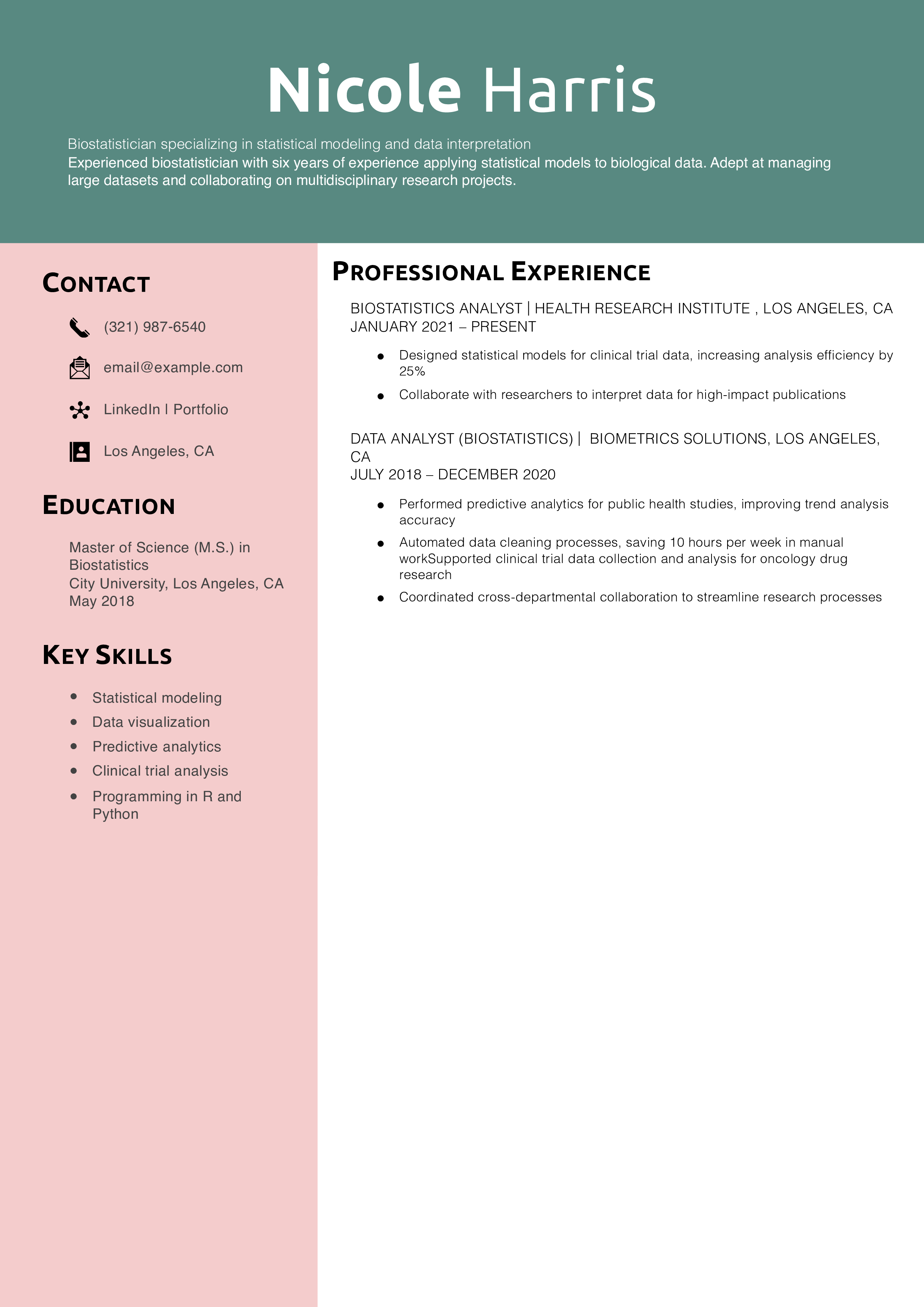
Why this biostatistician resume example is strong:
This resume highlights expertise in statistical modeling and underscores impactful contributions, like increasing the efficiency of statistical analyses by 25%. Explore best practices for highlighting technical skills in our guide.
Geneticist Resume Example

Why this geneticist resume example is strong:
This example demonstrates advanced genetic research expertise and highlights measurable impacts, such as improving genotyping accuracy by 18%. Learn more about how to enhance your resume in our guide.
Agricultural Biologist Resume Example
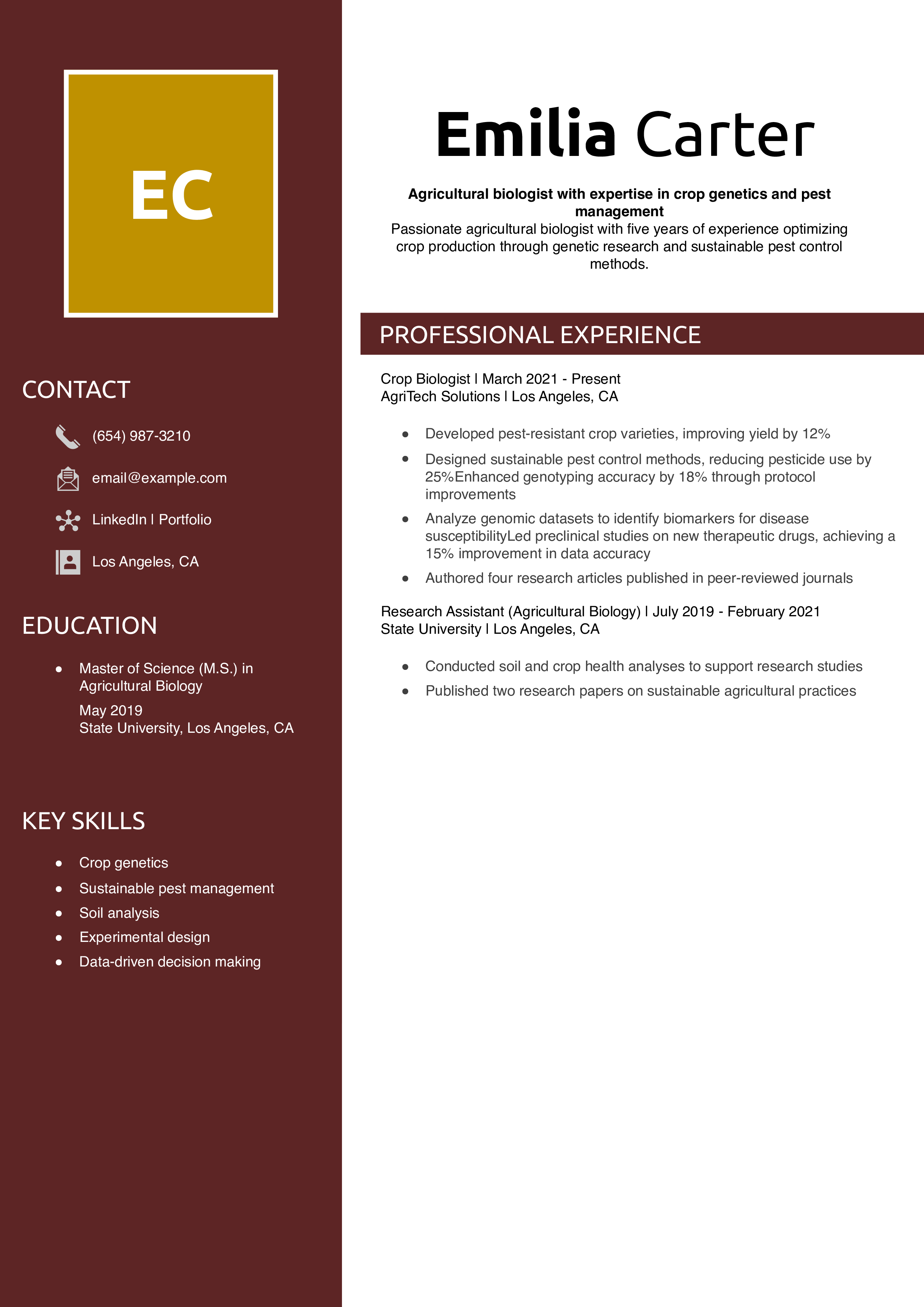
Why this agricultural biologist resume example is strong:
This example effectively communicates crop genetics and pest management expertise while including measurable outcomes like improving crop yield by 12%. Discover how to write effective bullet points for resumes in our guide.
Ecologist Resume Example
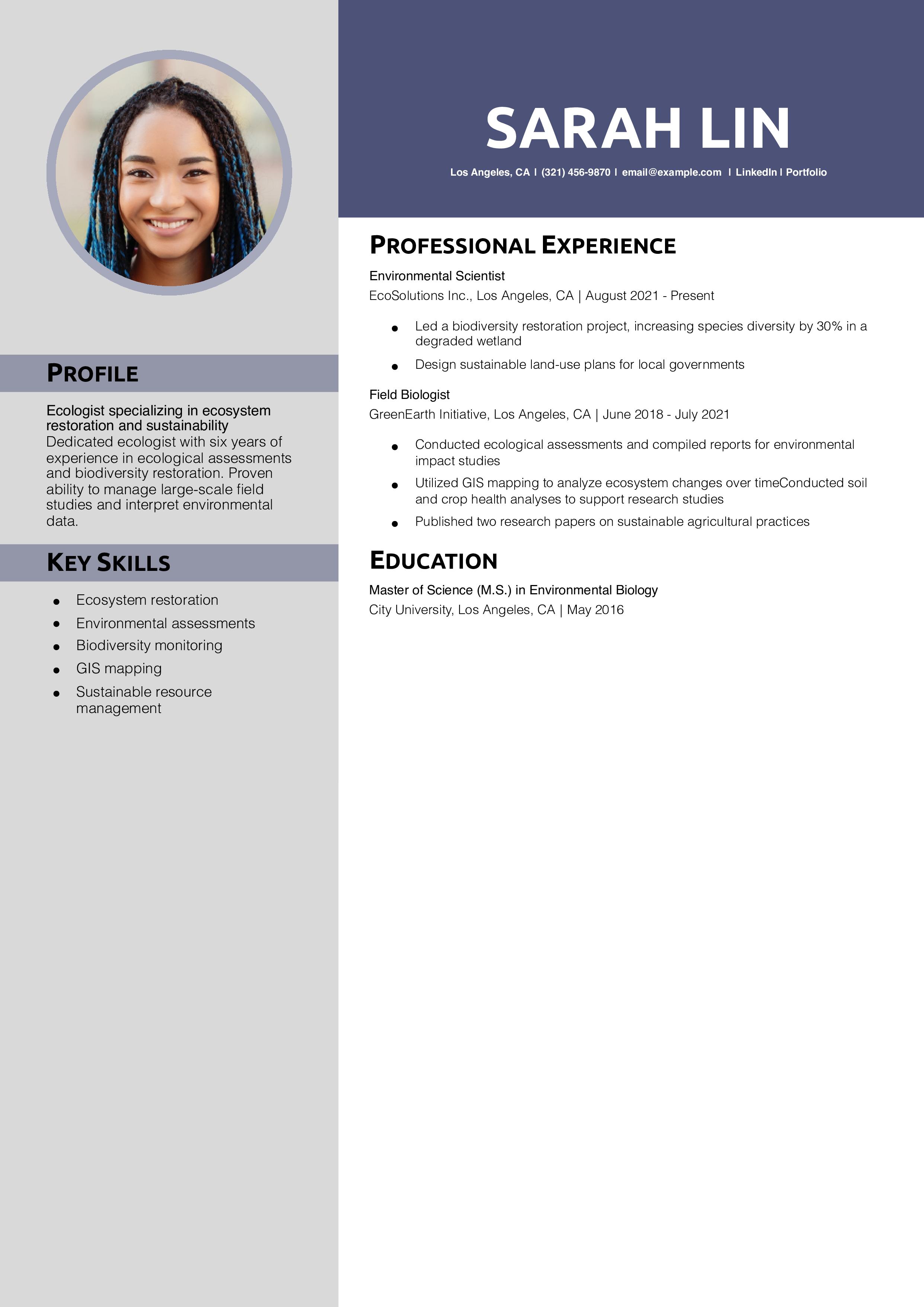
Why this ecologist resume example is strong:
This resume highlights critical achievements in environmental restoration projects, showcasing a 30% increase in biodiversity in a key study area. Learn more about how to enhance your resume in our comprehensive guide.
Wildlife Biologist Resume Example
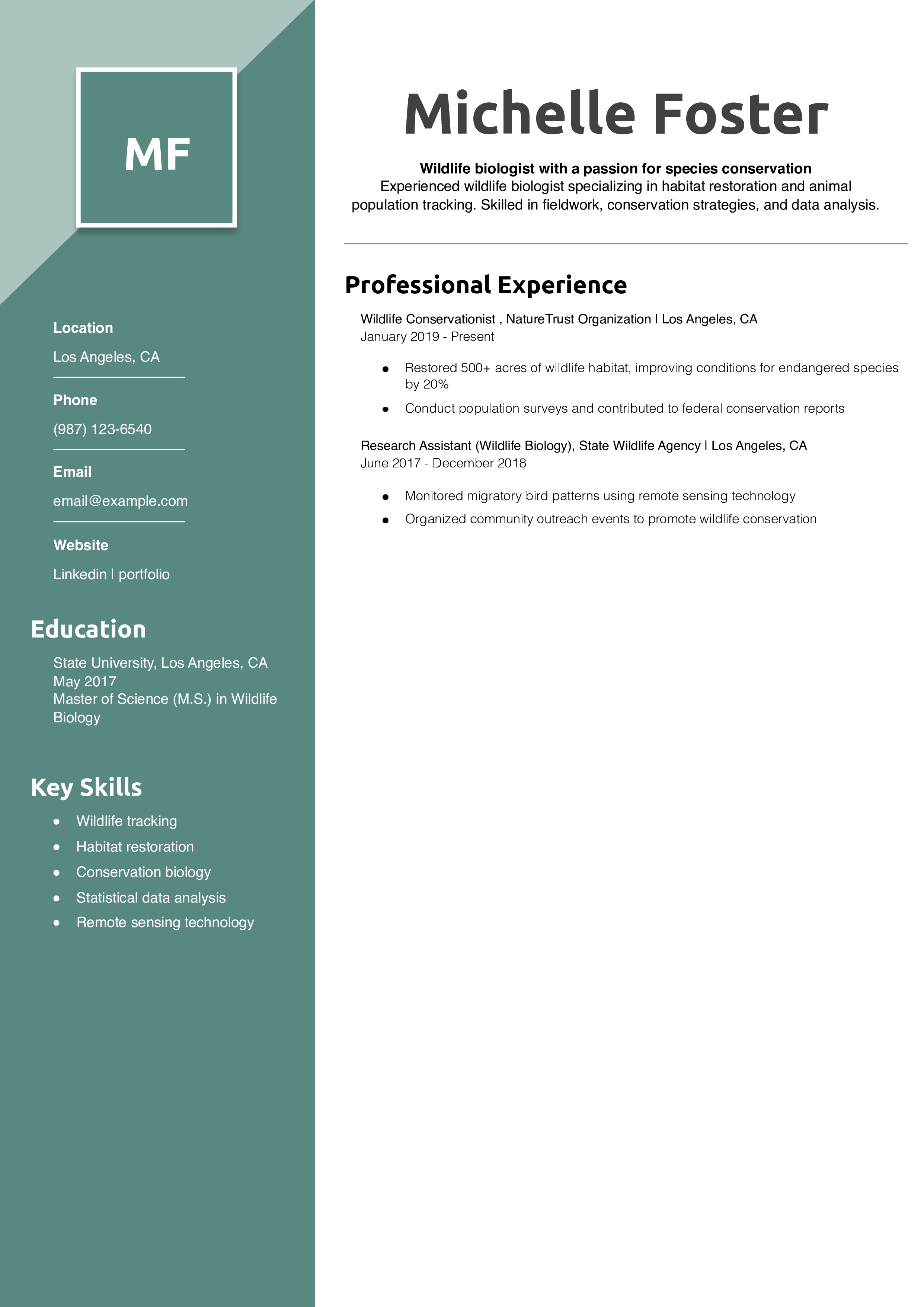
Why this wildlife biologist resume example is strong:
This resume emphasizes expertise in wildlife tracking and conservation, with tangible results like improving habitat conditions for endangered species by 20%. Explore tips for capturing your work experience on your resume in our guide.
Bioinformatics Specialist Resume Example
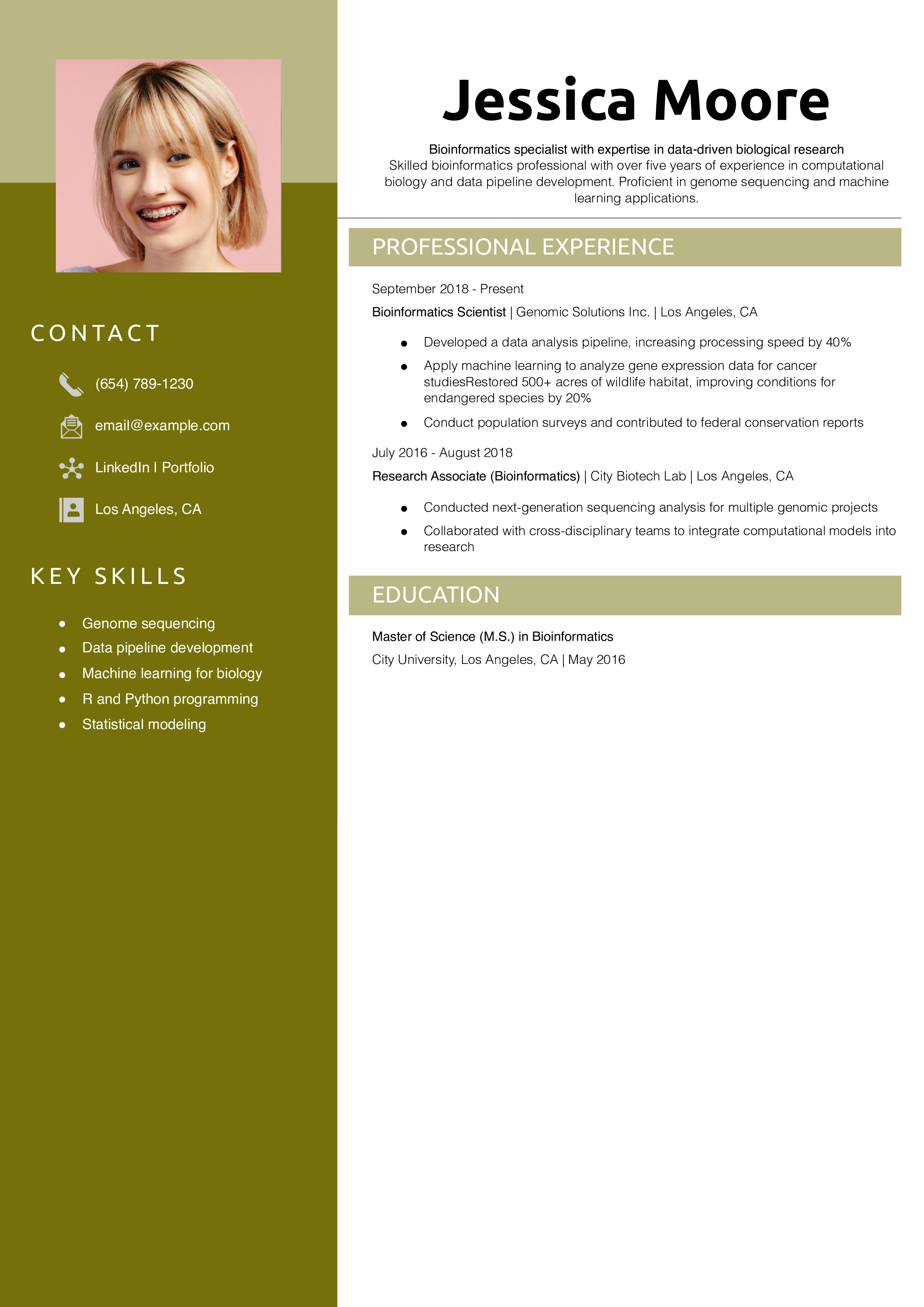
Why this bioinformatics specialist resume example is strong:
This example emphasizes advanced bioinformatics skills and notable accomplishments, such as developing a data pipeline that improved analysis speed by 40%. Learn more about how to craft a compelling profile in our guide.
Environmentalist Resume Example
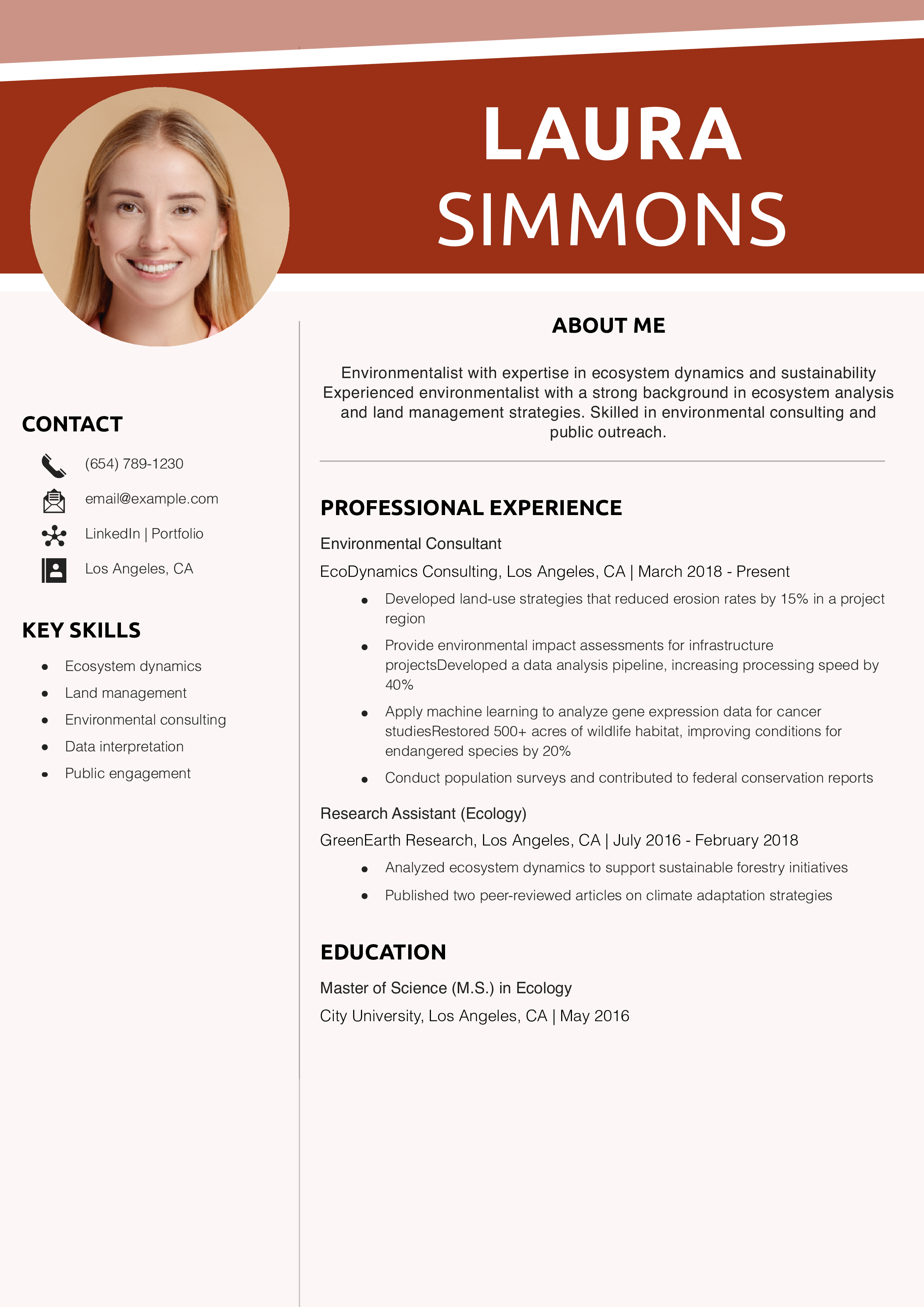
Why this environmentalist resume example is strong:
This resume effectively demonstrates expertise in ecosystem analysis and highlights accomplishments like reducing erosion rates by 15% in a targeted region.
Find advice on crafting impactful bullet points.
Marine Ecologist Resume Example
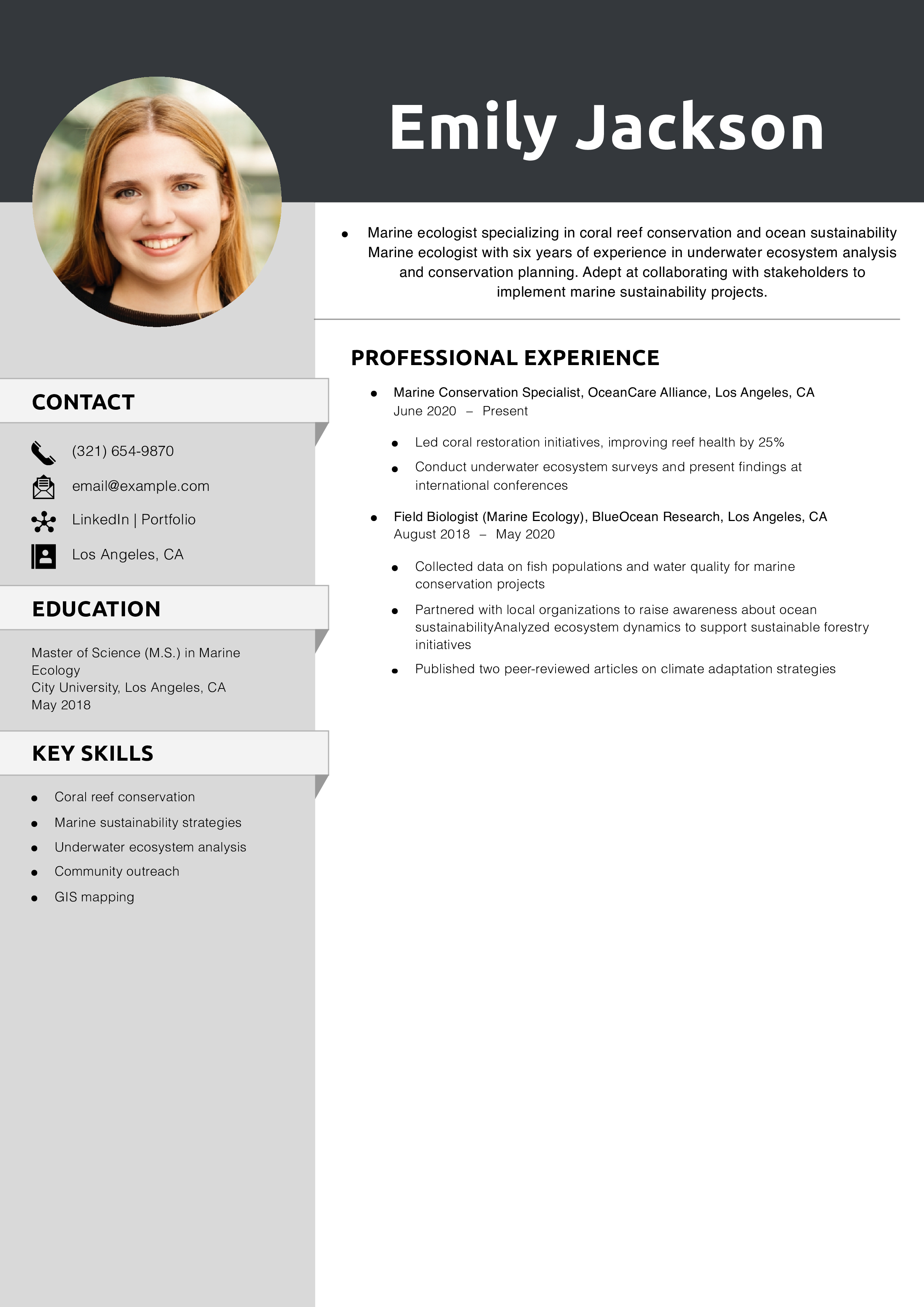
Why this marine ecologist resume example is strong:
This example showcases impactful marine conservation work, such as improving coral reef health by 25% through targeted initiatives. Learn more about how to create an impactful resume using our guide.
Biology Text-Only Resume Examples and Templates
How To Write a Biology Resume Example
When writing a scientific paper, you follow a clear structure with an abstract, introduction, results, and a bibliography. Your resume should also have a well-organized template allowing the reader to navigate your qualifications, skills, and professional achievements easily. Before crafting your content, be sure that your document contains the following sections:
- Contact information
- Profile
- Key skills
- Professional experience
- Education and certifications
1. Share your contact information
Provide your full name, phone number, email address, location, and a URL for your LinkedIn profile. Ensure that your information is current so recruiters and hiring managers can easily reach you to schedule an interview.
Example
Your Name
[email protected] | (123) 456-7890 | City, ST | LinkedIn | Portfolio
2. Write a compelling profile summarizing your biology qualifications
Open your resume with a powerful summary to immediately make a strong first impression on the hiring manager. Start by highlighting your job title, years of experience, and three to four specializations that align with the organization’s needs, such as PCR, flow cytometry, and DNA extraction. Highlight your unique expertise and areas of study as a biologist. For example, if you’ve previously worked on multi-million dollar clinical research studies to support drug discovery efforts, feature this information directly in your profile.
Senior-level Profile Example:
A senior biologist and researcher with over 10 years of experience specializing in ecological studies, molecular biology, genetic analysis, and laboratory research. A proven history of designing and leading large-scale studies on biodiversity and environmental sustainability to drive scientific advancements and conservation efforts. Skilled in collaborating with interdisciplinary teams to analyze complex biological data and develop innovative solutions for ecosystem preservation.
Entry-level Profile Example:
A junior biologist with a strong foundation in molecular biology, environmental science, and laboratory research. Skilled in conducting fieldwork, analyzing biological data, and utilizing advanced lab techniques to support genetics and ecosystem dynamics research. Passionate about applying scientific knowledge to solve environmental challenges and contribute to conservation efforts.
3. Add a results-driven professional experience section
Your work experience is the focal point of your resume, allowing you to convey your most notable accomplishments. As a scientist, it can be challenging to craft unique bullet points given the scientific and technical nature of your occupation. Rather than only detailing specific laboratory techniques and methodologies you’ve used in the past, emphasize how your efforts contributed to larger research objectives. For example, you might highlight how you integrated new quality control procedures to enhance data integrity for complex microbiology experiments.
Senior-Level Professional Experience Example:
Molecular Biologist
ABC Biotech, Boston, MA | January 2012 – Present
- Spearheaded genome editing projects, leading to a 30% increase in research productivity
- Conducted CRISPR experiments, achieving a 95% success rate in DNA modifications
- Supervise a team of eight researchers, mentoring junior staff and overseeing grant-funded initiatives
Entry-Level Professional Experience Example:
Research Assistant
XYZ University, Denver, CO | September 2020 – June 2021
- Supported faculty with sample preparation, maintaining a 100% compliance rate with lab safety protocols
- Conducted statistical analyses using R, improving the accuracy of ecological data models by 15%
Resume writer’s tip: Quantify your experience
Incorporating numerical data into your resume is a great way to enhance the impact of your bullet points. Although featuring numbers and metrics can be more difficult for scientists, it is possible to quantify your achievements using the right approach. For instance, if you worked on a particularly large clinical study, you might include a monetary figure to establish a sense of scope for the reader. If you helped to improve laboratory operations, you might highlight a reduction in sample analysis or data collection times.
Do
- "Reduced analysis time by 20% by streamlining lab workflows and implementing automated data collection tools."
Don’t
- "I improved lab workflows and data collection processes."
What if you don’t have experience?
If you’re a recent graduate entering the biology field for the first time, you’ll need to employ a different approach to market yourself effectively for entry-level positions. Internships can be incredibly valuable in demonstrating that you have hands-on experience in complex laboratory environments. Another option is to feature your academic research projects and skill sets to show hiring managers you have the knowledge and formal training to succeed.
4. Include relevant education and certifications
As a scientist, it’s important to feature your degrees and relevant industry certifications on your resume. Most job openings will require a bachelor’s degree in biology, molecular biology, or ecology. You can also further enhance your long-term career prospects by pursuing specialized credentials depending on your field of study. For instance, if you’re targeting a role within the pharmaceutical industry, you might consider a Certified Clinical Research Professional (CCRP) credential.
Education
Education Template:
[Degree Name and Major] | [Graduation Date]
[School Name] | [City, ST]
Example:
Bachelor of Science (B.S.) in Biology | May 2015
University of Washington | Seattle, WA
Certifications
Certifications Template:
[Certification Name] | [Awarding Organization] | [Completion Date]
Example:
- Certified Clinical Research Professional (CCRP) | SOCRA | April 2020
- Molecular Biology Techniques Certification | ASCB | August 2018
5. List pertinent key skills
Most organizations utilize some form of ATS to reduce the applicant pool and identify qualified candidates during the hiring process. To pass through the initial screening phase, it’s important to feature a robust list of skills that contains specific keywords from the job posting. Be sure to feature a wide array of scientific terms, laboratory techniques, and research methodologies to emphasize your comprehensive knowledge as a biologist. Below, you’ll find a list of skills to consider highlighting on your resume:
| Examples of Biology Key Skills: | |
|---|---|
| Assay development | Biochemistry |
| Cell-based assays | Clinical research |
| Data analysis | Data visualization |
| DNA extraction | Drug discovery |
| Ecology | Environmental science |
| Flow cytometry | Gene sequencing |
| Laboratory operations | Microbiology |
| Microscopy | PCR and qPCR analysis |
| Quality control | Scientific writing |
| Specimen handling | |
Resume writer’s tip: Use common action verbs
Lead each bullet point with a powerful action verb to add a unique and engaging element to your writing. Using proactive language allows the hiring manager to better visualize your accomplishments and the integral role you played in laboratory operations and research studies. That said, it’s important to diversify your usage of action verbs to keep your content fresh and compelling. We’ve compiled a list of verbs you can use to build the professional experience section of your biology resume:
| Examples of action verbs for biology resumes: | |
|---|---|
| Analyzed | Collaborated |
| Conducted | Created |
| Developed | Documented |
| Evaluated | Examined |
| Identified | Implemented |
| Improved | Led |
| Managed | Optimized |
| Oversaw | Performed |
| Prepared | Researched |
| Tested | Validated |
How To Pick the Best Biology Resume Template
When selecting your resume template, prioritize structure and readability over aesthetics. Opt for a clean, traditional layout that allows the reader to scan your document for key information easily. Avoid overly decorative designs with strong visual elements that might distract the hiring manager from your qualifications and achievements.
Frequently Asked Questions: Biology Resume Examples and Advice
According to the Bureau of Labor Statistics, occupations for biologist technicians are expected to grow by 7% over the next decade. Specialized scientific disciplines are also experiencing positive growth, as wildlife biologist jobs are projected to increase by 4% between 2023 and 2033. Although this data is encouraging, aligning your resume with the job description is essential to maximize your chances of securing interviews for the most lucrative opportunities.
For example, if you’re pursuing a position with a pharmaceutical company, emphasize your experience performing clinical research studies to support complex drug discovery initiatives. If your focus is on environmental science, highlight your experience performing laboratory experiments and research on natural habits and wildlife.
Reverse chronological is the ideal format for biologists. This approach features your work history towards the top of your document, allowing the hiring manager to view your most recent and relevant experience immediately. A combination format is only a viable option for recent graduates and entry-level job seekers, as this strategy prioritizes your academic achievements and skills in lieu of a robust work history.
Expert advice: include a cover letter with your resume
Once you’ve completed your resume, consider pairing it with a customized cover letter to enhance the strength of your application. Mention something specific about the organization’s reputation, mission, or research initiatives and why this draws you to apply for the opportunity. This adds a personal touch to your document that can help differentiate you from other applicants.
Check Out Related Examples
Resume Templates offers free, HR approved resume templates to help you create a professional resume in minutes. Choose from several template options and even pre-populate a resume from your profile.

